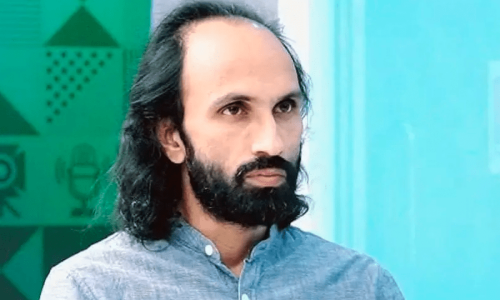KUWAIT: Kuwait’s emir on Tuesday quickly called an end to a planned two-day meeting of the Gulf Cooperation Council (GCC) within hours of its start amid the ongoing diplomatic dispute surrounding Qatar.
The sudden end of the meeting in Kuwait City raised new questions about the future of the GCC, a six-member Gulf Arab regional bloc formed in part to be a counterbalance to Iran, as King Salman of Saudi Arabia and UAE president Sheikh Khalifa bin Zayed Al Nayhan did not attend the summit.
Sheikh Sabah Al Ahmad Al Sabah’s decision came after the United Arab Emirates earlier in the day announced a new partnership with Saudi Arabia separate from the GCC.
The Emirati Foreign Ministry said the new “joint cooperation committee” was approved by the UAE’s ruler and president, Sheikh Khalifa bin Zayed Al Nayhan.
The ministry said the new committee “is assigned to cooperate and coordinate between the UAE and Saudi Arabia in all military, political, economic, trade and cultural fields, as well as others, in the interest of the two countries.”

The UAE and Saudi Arabia have cultivated close ties in recent years. Emirati troops are deeply involved in the Saudi-led war in Yemen. Abu Dhabi’s powerful crown prince, Mohammad bin Zayed Al Nayhan, also is believed to be close to Saudi Arabia’s young Crown Prince Mohammed bin Salman.
The Emirati announcement did not say whether any other Gulf Arab countries would be invited to join the new group, but the development puts pressure the GCC, whose members Bahrain, Kuwait, Oman, Qatar, Saudi Arabia and the United Emirates are all US allies.
The United States and its European allies have told the council’s members that the region remains stronger with them working together as a whole, while the countries themselves still appear divided over their future.
The fact the GCC meeting in Kuwait was to take place at all is a bit of a surprise, given the unusually sharp criticism among the typically clubby members of the GCC pointed at Doha.
The dispute began in June, following what Qatar described as a hack of its state-run news agency and the circulation of incendiary comments attributed to its ruler, Sheikh Tamim bin Hamad Al Thani. Soon after, GCC members Bahrain, Saudi Arabia and the United Arab Emirates closed off their airspace and seaports to Qatar, as well as the small peninsular nation’s sole land border with Saudi Arabia.
The boycott initially riled Doha, though it soon replaced food products with those flown in from Turkey and Iran.
However, Qatar’s foreign reserves have dropped by some $10 billion, a fifth of their value, since the dispute began. Those reserves are crucial in supporting the nation’s riyal, which is pegged to the US dollar, as well as funding the upcoming 2022 FIFA World Cup that Doha will host.
The boycotting nations allege Qatar funds extremist groups and has too-cozy ties to Iran. Qatar has long denied funding extremists but it restored full diplomatic ties with Iran during the crisis. Doha shares a massive offshore natural gas field with Tehran that gives its citizens the highest per-capita income in the world.
A similar dispute involving Qatar erupted in 2014. But this time positions have hardened against Qatar, whose support for Islamist opposition groups has angered the Arab nations now boycotting it.
Published in Dawn, December 6th, 2017












































